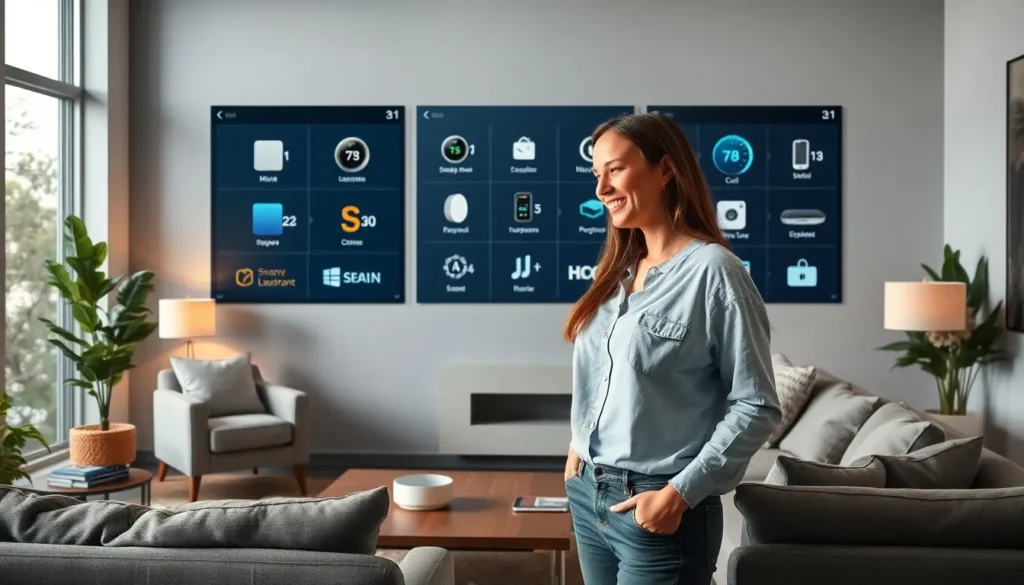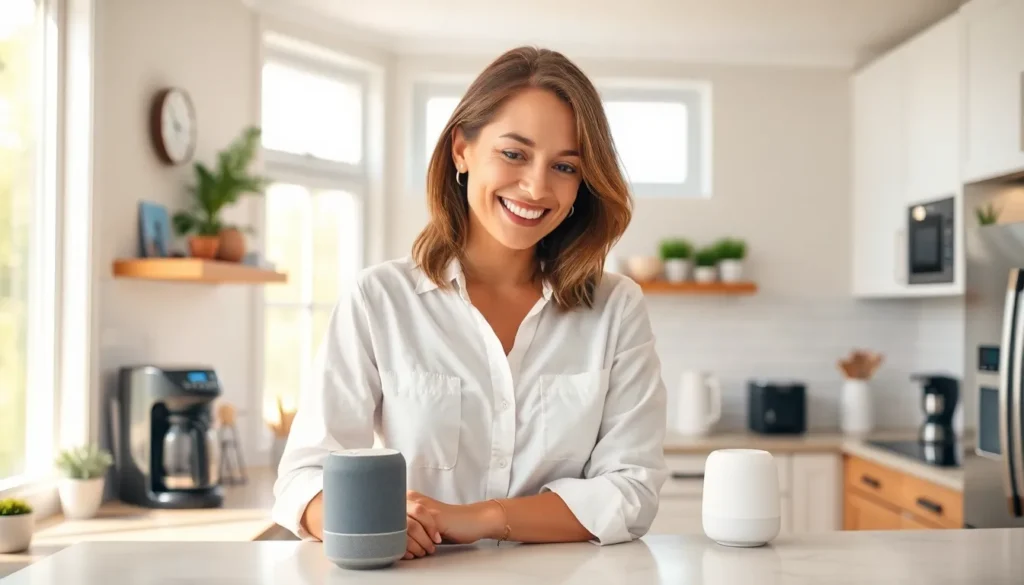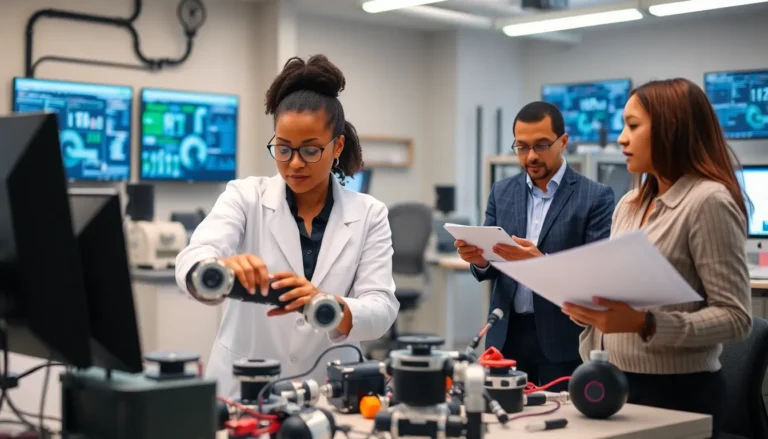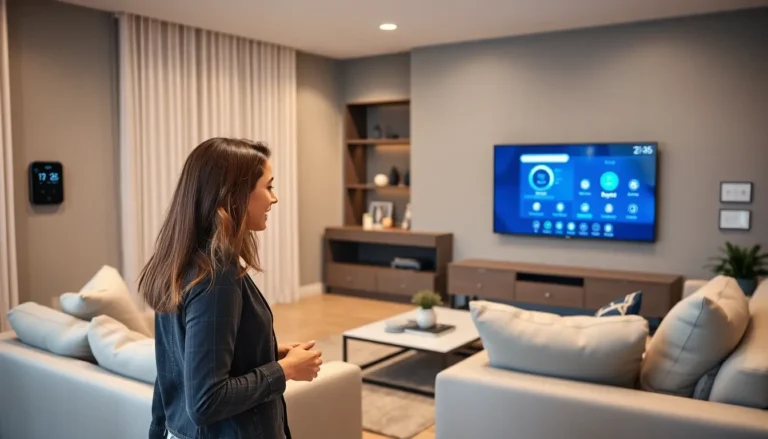Imagine waking up in a home that knows you better than your best friend. Smart homes of the future are not just a dream; they’re a reality waiting to happen. With the right technology, homes will cater to every whim, from brewing your morning coffee to adjusting the thermostat just the way you like it. Forget about fumbling for light switches or searching for the remote—your home will do it all for you.
Table of Contents
ToggleOverview of Smart Homes of the Future
Smart homes of the future leverage advanced technology to create seamless living experiences. These homes integrate devices and systems that communicate, respond, and learn from individual habits and preferences. Automation plays a central role, allowing for tasks like brewing coffee or adjusting temperature settings without user intervention.
Sensors will monitor various environmental factors, adjusting lighting and climate based on occupancy and time of day. Data analytics will predict user behavior, making smart homes more intuitive and personable. Home security systems will become increasingly sophisticated, utilizing facial recognition and remote access features to enhance safety.
Energy efficiency stands out as a significant benefit of future smart homes. Homeowners will monitor energy usage in real-time, receiving alerts for unusual consumption patterns. Devices will synchronize to optimize energy use, reducing costs and environmental impact.
Integration with wearable technology will further personalize the smart home experience. Wearable devices will communicate with home systems, informing them of physical presence or health-related parameters. Smart refrigerators might track dietary preferences and suggest grocery lists accordingly, ensuring nutritional choices align with individual lifestyles.
Entertainment systems also evolve in smart homes, providing personalized content recommendations based on viewing habits. Voice-activated assistants can control audio-visual systems, creating immersive media experiences effortlessly.
Future smart homes prioritize convenience, security, and sustainability. Each element connects to the home’s centralized system, enhancing the overall livability and efficiency. As technology advances, smart homes will redefine how individuals interact with their living spaces, fostering a sense of ease and intuitive connection.
Key Technologies Driving Smart Homes

Smart homes leverage several cutting-edge technologies to enhance user experience. These innovations foster intelligent environments that adapt to individual lifestyles.
Internet of Things (IoT) Integration
IoT integration stands at the forefront of smart home technology. Devices connect seamlessly, allowing communication among appliances, security systems, and personal devices. Sensors gather data to monitor energy usage and optimize performance in real-time, enhancing efficiency. Homeowners can control everything from lighting to thermostats via smartphones or voice commands. This network creates a cohesive system that responds to lifestyle patterns, promoting convenience.
Artificial Intelligence in Home Automation
Artificial intelligence transforms home automation by learning user behaviors and preferences. AI algorithms analyze daily routines and adjust devices accordingly, enhancing comfort and efficiency. Voice-activated assistants streamline operation, allowing for hands-free control. Security systems equipped with AI offer advanced features like facial recognition, enhancing safety. Automation becomes intuitive, making homes more responsive to individual needs and preferences.
Benefits of Smart Homes
Smart homes offer numerous advantages, enhancing living experiences and promoting a more efficient lifestyle.
Enhanced Security Features
Advanced security mechanisms boost homeowner protection. Systems utilize facial recognition technology for real-time monitoring, granting access only to authorized individuals. Sensors detect unusual activities, sending instant alerts to homeowners’ devices. Remote access enables control of security features from anywhere, ensuring peace of mind while away from home. Integration with smart locks adds convenience by allowing keyless entry. Comprehensive surveillance systems record footage for added safety, supporting a proactive approach to security.
Energy Efficiency and Sustainability
Energy conservation represents a crucial advantage. Homeowners track energy consumption with real-time monitoring tools, providing insights into usage patterns. Automated systems adjust settings based on occupancy, effectively reducing waste. Smart appliances operate at peak efficiency, minimizing overall energy costs. Notifications alert users about abnormal energy spikes, prompting quick action. Sustainable practices become easier through optimized resource use, contributing to a lower carbon footprint. Integration with renewable energy sources further enhances energy efficiency, aligning with environmental goals.
Challenges and Considerations
Smart homes present several challenges that homeowners should consider. Addressing these concerns ensures a sustainable transition to advanced living environments.
Privacy and Security Risks
Privacy and security risks feature prominently in discussions about smart homes. Devices connected to the Internet of Things often collect sensitive data, raising concerns over unauthorized access and data breaches. Security vulnerabilities can emerge when manufacturers don’t implement robust safeguards. The risk of hacking increases as more devices connect to home networks, making adequate cybersecurity measures essential for user protection. Homeowners must prioritize strong passwords and updated software to mitigate potential threats. Awareness of how data is used by smart devices will play a significant role in maintaining personal privacy.
High Initial Costs
High initial costs often deter homeowners from investing in smart home technologies. The price of smart devices can accumulate quickly, with advanced systems requiring substantial financial investment. Costs vary significantly based on the complexity and functionality of the devices installed. Homeowners may face additional expenses for installation and compatibility with existing systems. Budgeting for ongoing maintenance and software updates also becomes crucial for long-term usability. Assessing return on investment through energy savings and enhanced security can provide clarity on the financial impact of smart home features.
The Future of Smart Homes
Smart homes will transform living experiences, utilizing cutting-edge technology to enhance daily life. Innovations in automation and connectivity will shape how people interact with their environments.
Trends to Watch
Home automation is becoming increasingly mainstream, with widespread adoption of IoT devices. Wearable technology integration is a key trend, connecting health data directly to home systems. Voice-activated interfaces are gaining traction, enabling effortless control over household functions. Energy efficiency initiatives are also growing, promoting smart energy management systems to minimize waste. Smart appliances are evolving, featuring deeper learning capabilities and personalized settings. Increased focus on security, particularly through facial recognition and remote monitoring, ensures peace of mind for homeowners.
Predictions for the Next Decade
The next decade will witness a significant rise in AI-driven home automation. Homes will predict user preferences with remarkable accuracy, adjusting settings preemptively. Integration of renewable energy sources will likely become standard, supporting both sustainability and energy independence. Smart homes will feature advanced cybersecurity protocols, addressing privacy concerns with robust solutions. Enhanced interaction between smart devices will create cohesive and responsive living environments. Overall, these advancements will foster a stronger sense of connection between occupants and their living spaces.
The future of smart homes promises to revolutionize daily living through advanced technology and automation. With seamless integration of devices and systems homeowners will enjoy unparalleled convenience and security. As smart homes evolve they’ll not only cater to individual preferences but also promote energy efficiency and sustainability.
While challenges like privacy concerns and initial costs exist the benefits far outweigh the drawbacks. Enhanced connectivity and innovative solutions will create living environments that are not just functional but also intuitive and responsive. As technology continues to advance the smart homes of tomorrow will redefine the way individuals interact with their spaces fostering a deeper connection between occupants and their homes.





